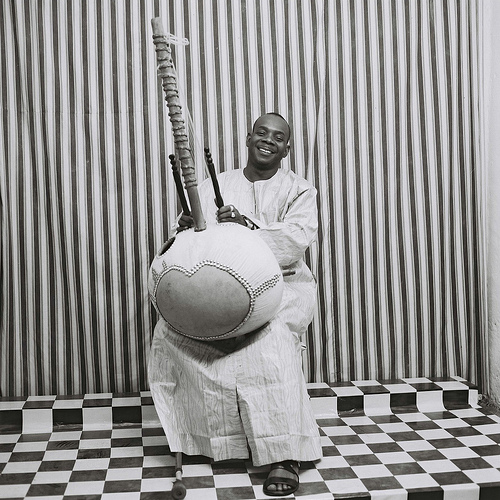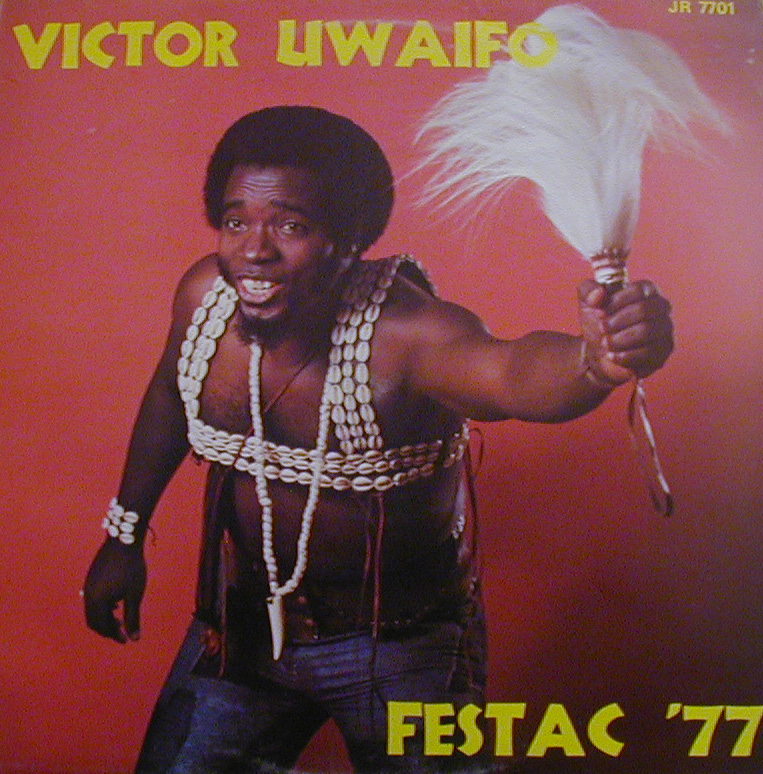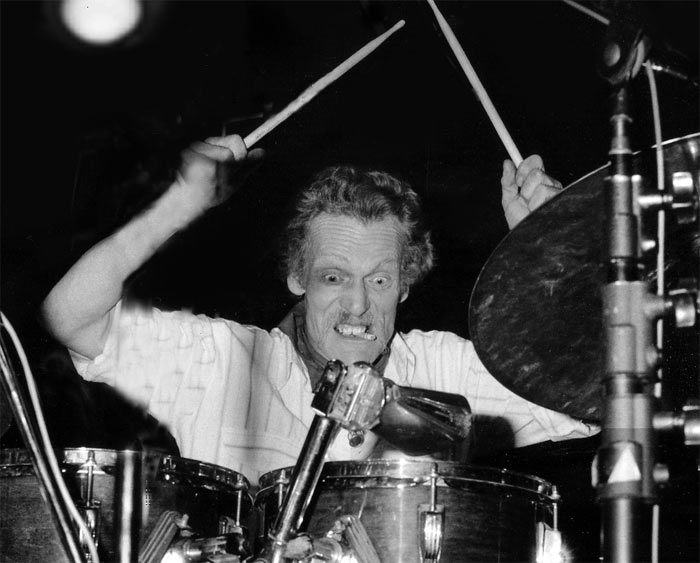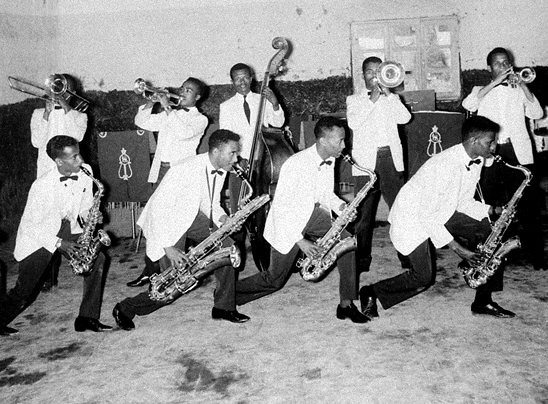In order to kickstart this irregular column about pop music either from or directly inspired by the African continent, it’s necessary to cover some of the amazing reissues and new albums that have been out in the last few months — if only to convey something of the Canutian task at hand.
Or perhaps this should be described as Sisyphean — as in pushing a boulder up a hill for all eternity. If someone asks you what sort of music that you’re into and you say ‘African’, it’s pretty much like being asked what you want to eat in a restaurant and saying: “Oh, you know, some food." It is this bewildering panoply of taxonomically confusing subgenres and categories that probably allowed the survival of the understandable but totally useless category ‘World Music’ for so long. As much as the manic culture of album reissues might be keen to ignore the saturation of the market in music, the Foppification of record collections and the disastrous cultural strip-mining effected by peer to peer file sharing, in this arena it is creating sizeable waves of interest in pop and rock fans.
This would have been unlikely ten years ago and unthinkable twenty years ago. Mainstream perceptions of Africa as a sonic continent are no longer that of a beam of light blasted out of Jon Hassell’s trumpet, filtered through Peter Gabriel’s goatee beard, refracted through Paul Simon’s spectacles and bounced off Brian Eno’s big shiny head.
This internet/reissue culture has allowed the vast African land mass to slowly fragment and shatter in front of our eyes — not just into composite countries, but into cities and towns and across class and religious divides. Again, I’ve got to stress that if you’re a specialist consumer, you’ll probably find this tedious to say the least but for the rest of us, seeing these new musical vistas, suggesting themselves, slowly feathering into view, then finally achieving crystal clarity is magnificent to say the least.

Mali
====
Issa Bagayogo Mali Koura [Six Degrees Recording]
Toumani Diabate The Mande Variations [World Circuit]
Amadou and Miriam Welcome To Mali [Because]
If in 2006 and 2007 the delights of Ethiopian jazz and funk slowly effloresced via Manteca’s superlative-inducing Ethiopiques series, then 2008 belonged to certain aspects of new Malian music and the heady funk and psych rock of the 60s and 70s in Nigeria.
People in Mali are fearsomely proud of their various indigenous musical styles, meaning until recently émigrés scoring cross-over success such as Mori Kante (of the ubiquitous house version of ‘Yeke Yeke’) were the exception rather than the rule. Instead, traditional kora players such as Toumani Diabate have fearsome tunnel vision or secular six-string ngoni players such as Issa Bagayogo ingest some American or European styles in such a way they become just another facet of Mande culture. It would be unthinkable to hear either artist, from either end of Malian society peddling tunes that are merely stapled to a sultry Rn’B rhythm or thumping four-to-the-floor beat.
Until a decade ago Bagayogo was an also ran musician, driving a bus and sliding into drug addiction. After hitting rock bottom and losing his wife and home, he kicked drugs and gave music another shot. The result has been a rich career, with most recent release Mali Koura sounding less like a fusion than a smooth new African pop form. Nods to Western production techniques are no more than nods, with his voice auto-tuned and mildly vocodered on ‘Sebero’. On laidback jazzy tracks like ‘Tcheni Tchemakan’ they re-appropriate the stuttering, shuffling Afro-funk rhythm from Jaki Leibezeit. And ‘Ahe Sira Bila’ glides by on a frictionless bed of pop dancehall reggae.
This stands in sharp contrast to Toumani Diabate’s introspective masterclass into devotional kora playing on The Mande Variations. While writing for our friends at the fabulous Plan B magazine I suggested that this album had ironically proved to be something of a leap forward in terms of what it was possible to do with the kora, an ancient 20-something stringed harp/lute/banjo-style instrument hybrid, within strict traditional boundaries. Diabate, as is the tradition, has grown up in a family of kora makers and players and is the equivalent to the laureate of the instrument – he is actually a state sponsored musician and certainly only interested in the instrument in the terms of the Mande tradition. Although he has branched out at various times into styles such as flamenco, he has never Westernized his sound. The Mande Variations contains reworkings of both traditional songs and new compositions (written in a traditional style), all rendered in Mali’s five note, pentatonic scale. He brings a technical precision that borders on autistic and a dedication to practise that borders on monastic. (Tellingly, when not practising or playing, Diabate is often found in his kora workshop building the things). As alien as this can sound on first listen, it is a genuinely beautiful album and breath-taking in its virtuosity; hypnotic and seductive.
Vastly different again are the so-called Blind Couple from Mali, Amadou and Miriam, who seem to have taken the world by storm recently with their Welcome To Mali long player. This astounding couple are often referred to as playing a Malian take on rock ‘n’ roll, but this leaves a lot up in the air as they are not kora players like Diabate or even proponents of the river blues of Ali Farka Toure. Instead they play a glistening international form of pop music that has, as one of its many ingredients, a modern take on Malian blues as well as electro, rock, funk, afrobeat, hi-life and synth pop. A truly original and international sound. (This was actually number 20 in our Albums of the Year List).

Nigeria
=======
Sir Victor Uwaifo Guitar Boy Superstar 1970 – 76 [Sound Way]
Various Artists Nigeria Rock Special: Psychedelic Afro-Rock And Fuzz Funk In 1970s Nigeria [Sound Way]
Seun Kuti + Fela’s Egypt 80 Many Things [Tot Ou Tard]
As mentioned above, nine out of ten rock fans arrive at African pop music not via Gracelands or Peter Gabriel 4 but via Fela Ransome-Kuti, the Nigerian Mark E Smith (er, shouldn’t that be James Brown? Ed) This is not just people my age and older but younger and younger still. (You can kind of tell, in the way that any new music by bands such as Vampire Weekend or Foals with an African bent to it is usually labeled as AfroBeat – even if it happens to be Palm Wine or High Life.) It’s clear that there is still a cultural need for a populist figure with the political and cultural clout as Fela. Seun Kuti, like his elder brother Femi, is a son of Fela and now leads his former band Egypt 80 as vocalist, saxophonist and organist. At just 26 Seun already has some of the insistent, commanding presence of his old man and when that rhythm section and those horns kick in on ‘Think Afrika’ and ‘Don’t Give That Shit To Me’ you get swept up in an immediate response of simultaneous familiarity and novelty.
Anyone wanting something much less strident and itchy should revel in the unabashed Ekassa showmanship of Sir Victor Uwaifo, who earned his awesome nomenclature Guitar Boy Superstar after building his first axe from scratch at the age of 12. This is as apolitical as Kuti is political, firmly rooted in Benin folklore and with both eyes fixed squarely on the dance floor. Prior to Uwaifo, this kind of music would be heard only once or twice a generation during the coronation of a new Obas or Benin King. Sir Vic thought ‘Sod that’, updated the sound with a sublime dash of high life and released albums worth of the stuff, and some of the best tracks are compiled here. Cash back.
My favourite African reissue this year was Sound Way’s just amazing Nigeria Rock Special: Psychedelic Afro-Rock And Fuzz Funk In 1970s Nigeria which found its way into our Compilations, Reissues and Mixes of 2008 List. Surprisingly, this compilation of gems more than lives up to its preposterous name and is entirely deserving of the luxuriant packaging it lives in. Lots of young Nigerians were forming bands in the late 60s and 70s inspired not just by their own musical heritage but by the frequent visits of Albert Steptoe (Surely you mean Ginger Baker? Ed) who played live with Fela and his own Nigerian influenced band, Airforce and also by radio broadcasts of Jimi Hendrix, Led Zeppelin and Mr Dynamite himself: James Brown. And I’m not only telling you to buy this but everything in Sound Way’s Nigeria Special series. Especially the Disco Funk comp. Why? Because your life won’t be complete until you do.
Coming soon: An interview with Extra Golden and a focus on new albums and reissues coming out of Benin and the Congo.

Harold!



